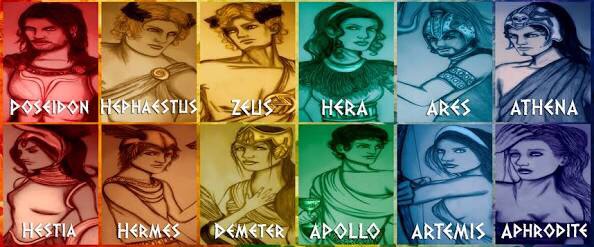The Twelve Olympians
The Twelve Olympians
The twelve great Olympians were supreme among the gods who succeeded to the Titans. They were called the Olympians because Olympus was their home. What Olympus was, however, is not easy to say. There is no doubt that at first it was held to be a mountaintop, and generally identified with Greece's highest mountain, Mt. Olympus in Thessaly, in the northeast of Greece. But even in the earliest Greek poem, the Iliad, this idea is beginning to give way to the idea of an Olympus in some mysterious region far above all the mountains of the earth. In one passage of the Iliad Zeus talks to the gods from "the topmost peak of many-ridged Olympus," clearly a mountain. But only a little further on he says that if he willed he could hang earth and sea from a pinnacle of Olympus, clearly no longer a mountain. Even so, it is not heaven. Homer makes Poseidon say that he rules the sea, Hades the dead, Zeus the heavens, but Olympus is common to all three. Wherever it was, the entrance to it was a great gate of clouds kept by the Seasons. Within were the gods' dwellings, where they lived and slept and feasted on ambrosia and nectar and listened to Apollo's lyre. It was an abode of perfect blessedness. No wind, Homer says, ever-shakes the untroubled peace of Olympus; no rain ever falls there or snow, but the cloudless firmament stretches around it on all sides and the white glory of Sunshine is diffused upon its walls. The twelve Olympians made up a divine family: (1) Zeus (JUPITER), the chief; his two brothers next, (2) POSEIDON (NEPTUNE), and (3) HADES, also called PLUTO; (4) HESTA (VESTA). their sister; (5) HERA (JUNO), Zeus' wife, and (6) ARES (MARS), their son; Zeus' children: (7) ATHENA (MINERVA), (8) APOLLO, (9) APHRODITE (VENUS), (10) HERMES (MERCURY), and (11) ARTEMIS (DIANA); and Hera's son (12) HEPHAESTUS (Vulcan), sometimes said to be the son of Zeus too.



Comments
Post a Comment